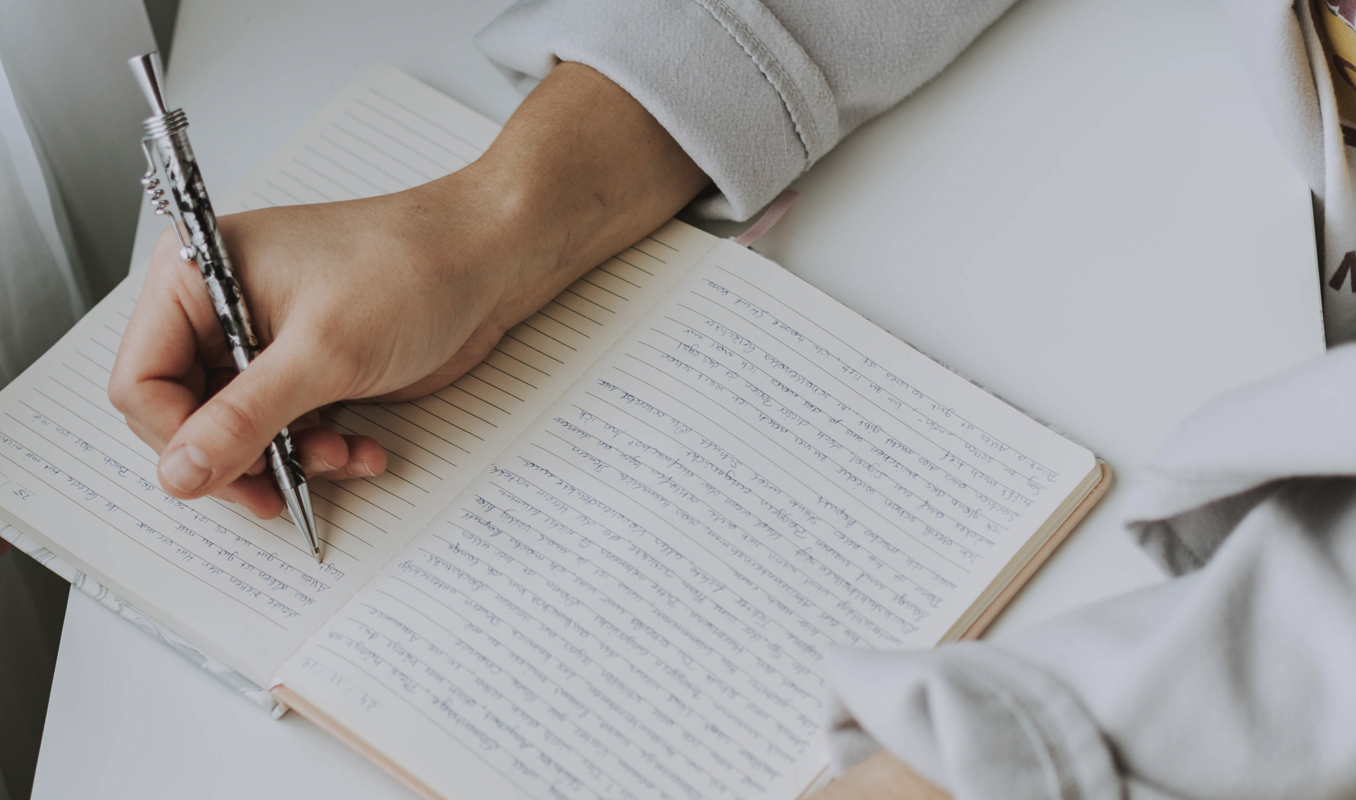
Every writer faces different challenges, from self-evaluation and editing to finding the time and motivation to write. We asked Vahni Capildeo, who is taking part in our Imagining the City programme, for their advice on creating a writerly state of mind and how to keep a writing journal in the quieter moments of your day.
Vahni is one of our five UNESCO City of Literature Virtual Writers in Residence, who are exploring connections between Norwich and their own cities, linking up with local writers and reflecting on their experience as a writer.
1. Learn to identify and unpack your own private codes
What do I mean by a ‘private code’? Everyone speaks their own secret language, to themselves. Part of the process of editing is learning to recognize what you have hidden without intending to hide it. I am no enemy to mystery; bear with me. As a reader giving feedback to other writers, sometimes I feel a kind of halt or squirming movement in a poem. Sometimes the language thins out, flat on the page and without music, feeling like a song lyric without body and breath to lift it.
It often proves that the writer has omitted to say what they wanted to say, leaving out some aspect of a scene, image, emotion, rhythm, etc. They leave it out precisely because it is so alive in their imagination and seems so very present to them. It is as if what they write is a reminder to themselves of what they thought or felt. Sadly, unless it is written out to be present in words, it will not be present to the reader. What to do with scribble that traces the unexpressed – but probably not inexpressible – conception in the mind? Expand? Intensify? Specify? Are you so caught up inside your writing that you forget to write it?
One of my private code words is ‘night’. It took me a long time to realize why ‘night’ deeply dissatisfied me, not just because it is a poetic commonplace. I sat with an unsatisfactory draft, and without any intention of ‘writing’ or ‘editing’, and simply contemplated ‘night’.
‘Are there words or allusions that you use, which you might need to investigate for their fuller meaning?’
It turned out that for me, night indicates a change in the sonic environment. Night is when you hear different things, and when you hear differently. While for some other writer ‘night’ could indicate the threshold between bright and dark, or between some kinds of work and other kinds of work, or waking and sleep, or relative safety and relative danger, ‘night’ in my head meant an urban environment where the outer loops of traffic would purr more audibly while nearby traffic quietened down, and one dog barked to another dog across the neighbourhood. ‘Neomarica Sky Jet’, in Measures of Expatriation (2016) – my fifth published full-length book – is the poem where I finally began to unpack what my memories coded simply as ‘night’. Are there words or allusions that you use, which you might need to investigate for their fuller meaning? How to make these secrets personal to the reader, no longer personal only to you?
This business of my night-obsession is something I often mention; apologies if you have heard or read it in another form elsewhere. Unriddling the unnecessary shorthand and confusion, while respecting essential mystery, still is one of my key principles in editing as re-vision. I’ve used the example of poetry, a genre in which I often work. However, the way of thinking will be similar for prose writers. While in this case I ‘let go’ and watched and listened to sounds and memories forming or diffusing themselves around ‘night’ in my imagination, you might prefer to talk yourself through any too-thin, too-compressed, coded areas in your writing, perhaps recording yourself. You might want to draw or paint, thinking about your words, then pushing away the thought of them, then going back. Experiment. See what unreels.
2. Be careful, adventurous and creative
If it is possible, be careful, adventurous, and creative about the last thing you read or hear or say before you sleep, and the first thing you utter or try to frame in your mind when you wake up. I am not talking about a tyrannically consistent practice that would ignore exhaustion, or coupledom, or shift work. Even at horridly precarious times, for example pre-pandemic when I might have four hours’ turnaround to shower and pack between travel for lowish-paid gigs, and when I would nap, drooling, my cheek pushed against a train window, I would try to clutch at a word or image at that moment of going under into sleep or a switched-off state, like a child clutching at seaweed on a chancy sea.
‘I would try to clutch at a word or image at that moment of going under into sleep or a switched-off state.’
This would not be a word or image that randomly happened to float in. It would be something meaningful to me, preferably created by someone else. I found that doing this consistently gave me a better quality of dreams, both vivid and restful. Writing also seemed easier (if I managed to get to a notebook).
How will you choose, or identify, or find your pre-sleep word or first-thing-on-waking image, if you want to anchor yourself this way? Perhaps you already have one. You just have to recognize it: the phrase of music that is like a soundtrack to your happier moments; the colour you wish you could bathe in; the few words that settle with you, even if they are from a ‘silly’ or ‘rubbish’ source that would embarrass you to bring to a creative writing group.
Sometimes a guided practice can help with this. One spring, I joined an online group that was tasked with reading the same poem by Spanish mystic St. John of the Cross every single night for weeks. As a quick and restless reader, I was dismayed, then bored, then agonizingly bored. I passed through numerous shades of discomfort, but stuck with the practice of reading these verses, where the narrator slips out of a quiet house at night, joining their divine lover, and passing out of normal consciousness. Slowly I realized that one night I seemed to sense the scented wind riffling through the lines; another night, the bony, substantial comfort of the lover’s chest; another night, the daring quality of the escape. Eventually, recalling a few words of this poem became like a ladder for me. It smoothed out the day and took me instantly into a garden of sleep.
Why is this important? First, it is about resisting the tearing apart of our thoughts in precarious times. Finding small ways of refreshing or guarding your state of mind can make for less desperate breaks and deeper, if brief, rest. Second, that blend of openness and choice…being open to sleep, having chosen what will companion you into sleep…keeps you close to creative process.
I am talking about maintaining creativity in your ways into and out of rest, not about extending those ways into writing goals. However, some people like to jot down a record of some kind when they wake up. They keep a notebook by the bed or record something on their phone. That is up to you.
Both these reflections are about the quality of attention. They are about things you can do with your mind when you are not in the middle of drafting a piece, but which relate directly to how you approach your writing, and how you go back to it. Happy decoding. Happy sleeping and waking.
Photo by fotografierende from Pexels
 Looking for some inspiration?
Looking for some inspiration?
Join us this February for Imagining the City: a series of daily writing prompts inspired by the hometowns of our UNESCO Cities of Literature Virtual Writers in Residence. From bookshops to beaches, our writers have devised a series of images and written prompts that reflect the concerns they’re exploring throughout their virtual residency. Get your writing prompts >>
You may also like...
Five creative writing tips for any writer
Forward Prize-winning writer Anthony Capildeo shares their best advice for aspiring writers

19th February 2021
Don’t create in front of a computer
In a world of screens and questionable wi-fi connections, Valur Gunnarsson recommends spending more time thinking than writing

19th February 2021
Lighthouse and Anchorage: Journal Entries
Join Vahni Capildeo on a reflective walk along the Edinburgh coastline

5th February 2021






